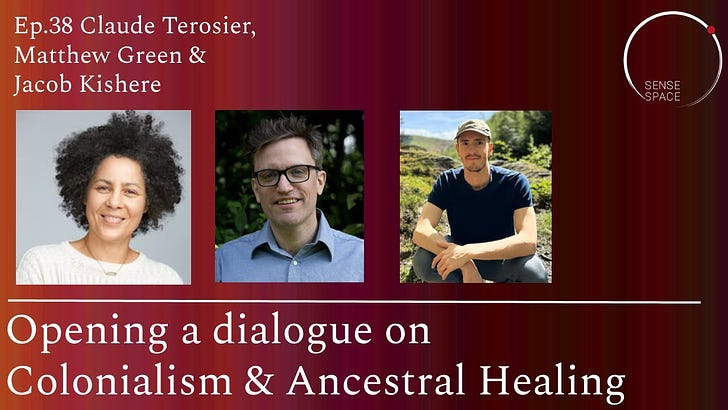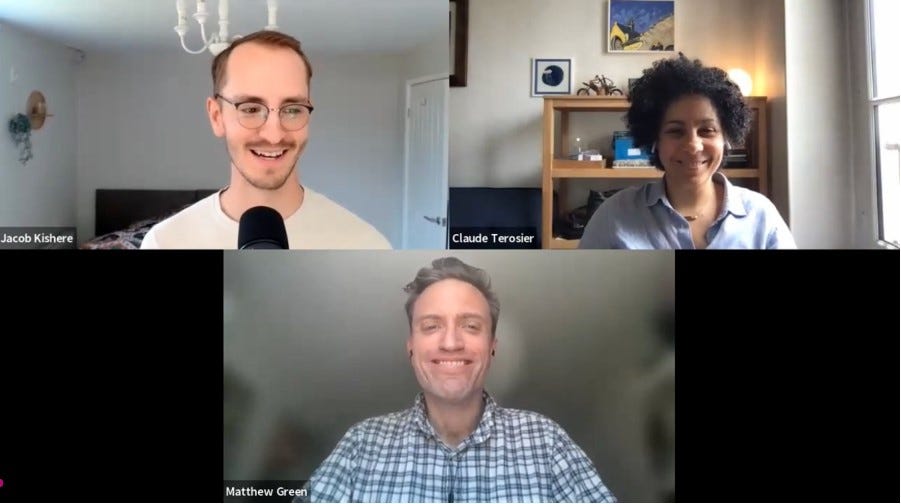A Dialogue on Colonialism, Ancestral Healing, and Relation, with Claude and Jacob (Podcast)
Our conversation took us into uncomfortable territory, and that was the point.
This edition of Resonant World is my explanation of the wider context to a dialogue that took place between myself, Claude Terosier and SENSESPACE podcast host Jacob Kishere exploring our relationship with colonialism and racism. For Claude’s account of the back story, please visit her essential newsletter:
As Claude put it, our intention with the dialogue was to create a space where we could engage with these issues in a way that could bring us closer, rather than create more polarization. Our hour-long discussion, recorded on June 9, 2023, blended elements of the transparent communication skills Claude and I have been practising in the Timeless Wisdom Training led by Thomas Hübl, and the principles of dialogue elaborated by physicist-philosopher David Bohm that underpin Jacob’s approach with SENSESPACE, which he explores in his excellent culturepilgrim newsletter:
We warmly invite you to watch the dialogue on YouTube, or listen on Spotify. Though we entered some challenging territory, we each found it a powerful, supportive and enlightening exchange, and we hope it will inspire further conversations to illuminate the enormous shadows cast by the collective trauma of colonialism, slavery and racism.
Resonant World #36
In April, my friend Claude Terosier published a newsletter with the arresting title: “I, too, am Sexist and Racist.”
Citing anecdotes from her own recent experience, Claude described how she had at times noticed herself adopting sexist or racist attitudes. She went on to explore how these prejudices reflected the conditioning she’d received growing up in her native Guadeloupe in the French West Indies as a mixed raced woman of French-Caribbean descent, and then settling in France, where she worked in the tech sector, including founding and running a start-up teaching kids to code.
Claude wrote of the troubling attitudes she’d observed arising within herself:
“I am not proud of it, but I also feel the need to be honest, and to own it in me instead of blaming ‘others’. We are the system, it does not exist outside of us.”
Claude’s words landed in me so deeply that I knew I had to respond. But I was at loss as to how.
Ancestral Legacy
I’d got to know Claude through a two-year training in individual, ancestral and collective trauma run by the facilitator Thomas Hübl. The course invites a deep process of self-inquiry, and I’d always been impressed by the tenacity and transparency with which Claude approached the work, both during in-person retreats in Germany, where we’d first met in March last year, and in many online sessions.
Claude’s post on sexism and racism had followed a previous, equally honest, account of the complexities of being mixed race that she’d published a week earlier.
Claude revealed that the intense inner explorations we were undertaking in the training had made her realise how far she’d been avoiding confronting the legacy of her ancestry. She now knew that she would have to integrate both the white and Black sides of her lineage to feel fully whole.
Claude’s mother hailed from a well-off region around Lille in northern France, and Claude described how this white, bourgeois heritage had given her a sense of “social safety” — and the confidence to blend easily into the French elite.
Her father’s ancestors, by contrast, included a lineage of Black slaves — transported from Africa and forced to work for generations in abominable conditions in the sugar plantations of Guadeloupe. The only exception on her father’s side was his mother, who was born to a white Creole — a member of the slave-owning class — and a Black maid working in his house. Claude doubted it had been a love match.
As Claude wrote, while pursuing her career in France, the legacy of her heritage had mostly been something she’d chosen to ignore:
“To never mention, even to myself, that I come from a lineage of black slaves. To pretend it is not a topic, that everything is normal.
“And to not acknowledge the shame it makes me feel.
“So here I am now, naming things, saying them out loud. It is a first step in my exploration of my identity. I don't know where this will lead me, but I know I want to look at my heritage, own it, and integrate it fully.”
Watershed Moment
Reading these posts gave me a much clearer sense of Claude’s personal process during the training. But more than that, her words challenged me. Not only was Claude finding the strength to face questions of enormous personal import, she was sharing her process on a public platform, in the hope it would inspire others grappling with similar questions over identity, heritage and structural oppression. The courage she displayed in her “I, too, am Sexist and Racist” post seemed to mark a watershed moment — for her, and by extension, for the 400 students in the Timeless Wisdom Training, since whatever one person experiences inevitably ripples through the group field.
I knew I had to respond in some way, but felt stuck.
I considered undertaking a similar exercise — excavating my own sexism and racism in a written post for Resonant World. But I hesitated for the simple reason that I was worried about what others might think of me if I owned my own biases with equivalent honesty to Claude.
But then another idea arose.
Claude and I had often spoken about our experiences in the collective trauma work. (I wrote about the powerful “Resonance Circles” Claude hosts in Resonant World #30). I wondered if the level of trust we’d developed could underpin a deeper dialogue between us on racism and colonialism inspired by her posts — only this time in public. (Sexism will have to wait for a future edition of Resonant World).
The stage was set when Jacob Kishere generously offered to host the process on his SENSPACE podcast — which we’d previously used as a platform to discuss the trans-generational trauma of the First and Second World Wars (Resonant World #7), and to explore narratives around climate change.
“New Truths”
For me, our dialogue with Claude felt like an important opportunity to begin to engage more deeply with some of the most profound collective trauma fields. Bayo Akomolafe observed at the Collective Trauma Summit 2022 that the “slave ship didn’t die” — it vomited its guts on the shore, and we’re still living in the matrix of values that designed it (Resonant World #6). Yet colonialism, racism and slavery are such highly-charged topics, and so contentious, that I’ve often felt safer staying silent.
Despite my trust in the process, I entered our dialogue with some trepidation — wary of putting my head above the parapet on such a live frontline in the culture wars. At the same time, I wanted to explore whether holding an open conversation in this way could, as Jacob said in his introduction:
“Get closer to some new truths, tap into some new energies, allow a space for new insight to emerge.”
I don’t want to try to summarise our whole dialogue here, since I feel the power of the conversation comes through much more clearly from listening to our process as it unfolded in real time (you can find it on YouTube, or listen on Spotify).
Nevertheless, reviewing the podcast, it occurred to me that there were at least three ingredients that were critical to supporting a meaningful exchange:
We were able to make room for my discomfort, as a white man, at approaching these topics. By allowing this discomfort to be witnessed and acknowledged — rather than pretending it wasn’t there, or making it “wrong” — we made space for a much deeper conversation to develop.
We were able to welcome Claude’s anger at the sheer enormity of the injustice and suffering her ancestors had endured — and what she described as their “bottomless” or “murderous” rage — as well as her anger at the continued racism and oppression at work in the world today, including in France. When this anger made its presence felt, we had established enough coherence in the space between us to feel into its energy without our process fragmenting.
Jacob’s skill as a facilitator — and his willingness to examine how these topics showed up in him — opened up new avenues in the conversation, disrupting any tendency Claude and I might have had to stay in the safety zone we’d already established between us — albeit via a lot of intense relational work through the individual and group practices in the Timeless Wisdom Training.
I hope you find the dialogue insightful. And I’d love to hear any resonance you feel in the comments. Thank you for reading Resonant World.
I write Resonant World in my spare time from my work as an editor at nonprofit climate news service DeSmog. Support from readers is a huge boost — and that includes forwarding, sharing, or commenting in response to my posts. Any variety of coffee most gratefully accepted! Thank you for reading.







